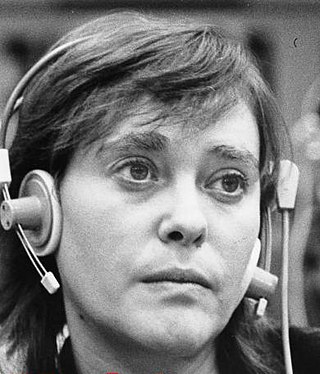Mariateresa Di Lascia
Italian politician and writer (1954–1994) From Wikipedia, the free encyclopedia
Mariateresa Di Lascia (3 January 1954 – 10 September 1994) was an Italian politician and writer, activist, human rights' supporter and advocate of non-violence.
Mariateresa Di Lascia | |
|---|---|
 | |
| Born | 3 January 1954 |
| Died | 10 September 1994 (aged 40) Rome, Italy |
| Spouse | Sergio D'Elia |
Biography
Di Lascia was born in Rocchetta Sant'Antonio, Italy. She attended college at the University of Naples. She was studying Medicine with the goal of becoming a lay missionary. However, within three years she had become so involved in her political activism that she left university.[1]
Political activity
Summarize
Perspective
Di Lascia joined the Radical Party in 1975. In 1982, she was elected as the national deputy secretary of the party under the leadership of Marco Pannella. Her initial activism was aimed at eliminating hunger. She coordinated the Survival 82 campaign, mobilising mayors in France, Belgium and Italy to support laws against hunger. Di Lascia was an environmental activist, acting to remove and prevent nuclear power in Italy. She proposed penitentiary reform in 1990 and the abolition of the death penalty in 1993. Di Lascia created a campaign to support victims of the war of the former Yugoslavia with Adriano Sofri in 1993. She also demonstrated about the liberation of Tibet at the Human Rights Conference in Vienna the same year. Di Lascia was in favour of Hahnemannian homoeopathic medicine and in 1991 she founded the Homeopathic Patients Association (APO) as well as advocating for its legislation. The association is based in Naples. Di Lascia was the editor and a contributor for the newspaper Radical News in 1985 and 1986. Her articles were on ecology, medicine, justice and political current affairs. She also aired shows on both Radio Radicale and on Tele Roma 56.[2][3][4][5][6][7][8][9]
Death
Di Lascia died in Rome, Italy, on 10 September 1994, at the age of 40. Her death, of cancer, came just a few months after marrying Sergio D'Elia. Her first novel was Passage in Shadow, which won the Strega Prize in 1995.[10][2][11]
References
Wikiwand - on
Seamless Wikipedia browsing. On steroids.
